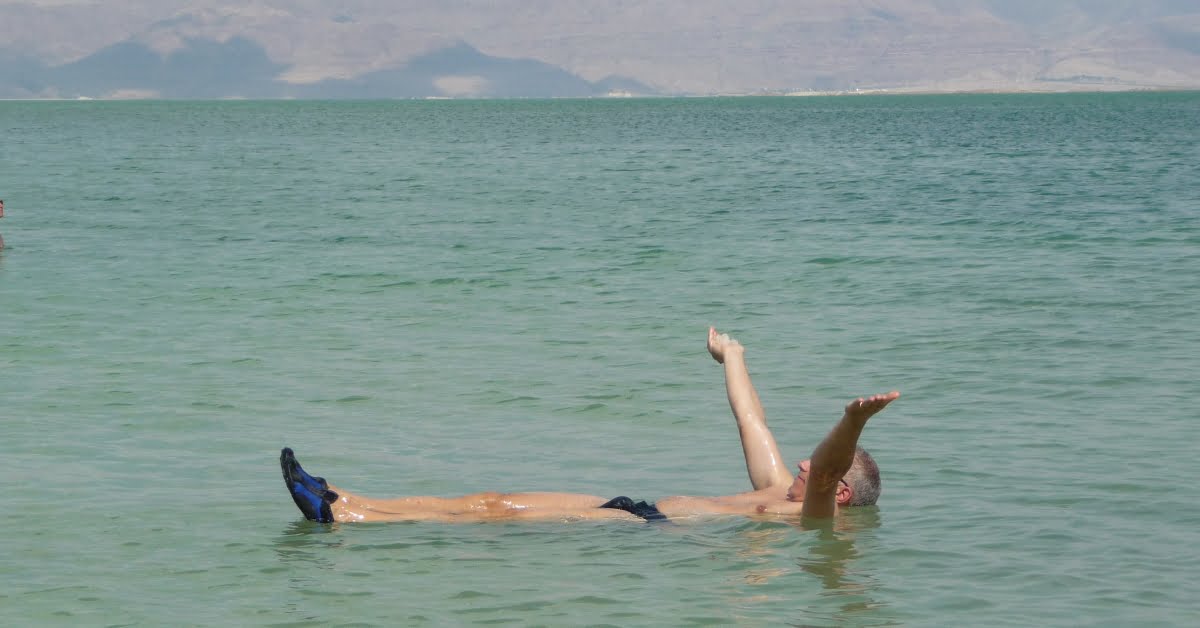One of the most famous facts about this lake on the border of Israel and Jordan is its amazing salinity, which prevents people from drowning. We checked how correct this statement is.
The fact that it is impossible to drown in the Dead Sea is reported by such sources as BBC, book "In the world of entertaining facts", school textbook "Geography in fifth grade" and many others. Yakov Perelman also writes about this in his "Entertaining physics", at the same time quoting a fragment from “Innocents Abroad” by Mark Twain: “It was a fun swim! We couldn't drown. Here you can stretch out on the water to your full length, lying on your back and folding your arms across your chest, with most of your body remaining above the water. <…> If you swim face down, then you move not forward, but backward.”
Indeed, this is a lake with a surface area of 605 km2 unique in a number of ways. Its surface is located on height about 434 m below sea level and sinking steadily, making the Dead Sea coast the lowest landmass on earth. In ancient times, the reservoir served as the largest source of natural asphalt, which is why the name given to it by the Romans was also found in literature until the end of the 19th century. Lacus Asphaltites. The last time a block of asphalt surfaced on the surface of the lake was in the 60s of the 20th century, and it weighed more than a ton. As for the Dead, this name was given to the lake by the Arabs for the same reason that in Hebrew it is called the Salt Sea or the Sea of Salt (יַם הַמֶּלַח). The fact is that the salinity of water in the Dead Sea is about 31–35%, which is about ten times the salinity of the World Ocean. As a result, it is very, very difficult for organisms to survive in such an environment. However, another popular fact that was spread by the same Yakov Perelman (“Its waters are unusually salty, so much so that not a single living creature can live in them”) or the editors of the encyclopedia Brockhaus and Efron (“All organic life is absent”), in fact turns out to be a myth: there are no higher organisms in the lake, but here lives about 20 strains of archaea (ancient and very tenacious microbes), more than 70 species of molds, viruses, and also, seasonally, the flagellated alga Dunaliella minor.
However, we are primarily interested in the possibility of drowning in the Dead Sea. It would seem that its high salinity, due to which the body itself is pushed out of dense water, really makes drowning impossible.

However, even a quick glance at the media can surprise people far from the topic: news constantly appears that people are drowning in the lake (one case, another, third). In 2017, this sad fate befell a deputy of the State Duma of the Russian Federation Vasily Tarasyuk. According to statisticsFor example, in 2009, 45 people drowned or almost drowned in the Dead Sea, in 2010 - 21, and in 2012 8% All those who drowned in the waters of Israel were in this lake.
It turns out that it comes down to what exactly is meant by the word “drown.” "Dahl's Explanatory Dictionary” defines it as “to go to the bottom, to plunge into water or another liquid without rising.” This definition is ideal for inanimate objects. As for people, we have all also heard about cases when they drowned, choking in water, but not sinking to the bottom of the reservoir (even in their own bathtub, like this happened with the famous singer Whitney Houston). Therefore, for the civilian concept of “drowning” others are more relevant definitionsfound on the websites of medical institutions:
- drowning is a terminal condition or death due to aspiration (penetration) of fluid into the respiratory tract, reflex cardiac arrest in cold water, or spasm of the glottis, which results in a decrease or cessation of gas exchange in the lungs;
- drowning is a type of mechanical asphyxia (suffocation) resulting from water entering the respiratory tract
With this understanding of the term, everything falls into place. Indeed, the Dead Sea deserves glory quite a dangerous place for swimming, because in it, due to the wind or simply relaxing, it is very easy to roll over and end up face-first in the water, swallowing some of it. And this can be a fatal mistake for two reasons. Firstly, the very entry of a large amount of water into the body directly causes the very state of asphyxia discussed above. Secondly, as we already know, this water is extremely salty, which, according to research, can trigger dangerous processes inside the body, from the heart to the stomach, even in children, not to mention the elderly (of whom there are many who drowned in the Dead Sea). Therefore, in this context, drowning in the body of water we are considering is very possible.
It is characteristic that in English, unlike Russian, there are two verbs meaning “to drown”: to sink (sink to the bottom like "Titanic") And to drown (choking in water, like Whitney Houston). And English-language sites often quite correctly emphasize that people in the Dead Sea are not able to do the first, but they can do the second. Moreover, Mark Twain was also right, original used the verb to sink, ambiguously translated by Yakov Perelman, but quite successfully presented in another translation: “We couldn’t manage to get into the water.”
Therefore, we can confidently say that the question of the possibility of drowning in the Dead Sea lies purely in the field of interpretation of the specified verb.
Half-truth
Read on the topic:
If you find a spelling or grammatical error, please let us know by highlighting the error text and clicking Ctrl+Enter.







